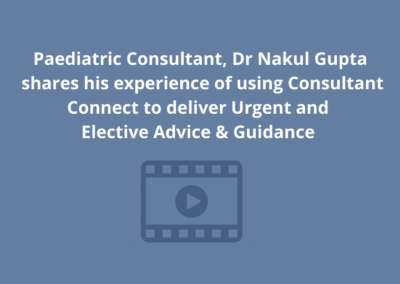‘Consultant Connect aids the management of complex patients, avoids unnecessary referrals when there is uncertainty, and it allows GPs to do more with their patients.’
We spoke with Dr Elizabeth Peak and Dr Drew Samimi-Mawby, who are both GPs in NHS Lanarkshire in Scotland and use Consultant Connect to obtain rapid Professional-to-Professional Clinical Decisions. They told us how the service benefits them in their everyday roles.
‘Receiving direct advice from a consultant can avoid admission to acute services or lead to a more specific clinic referral. I can also give improved care to my patients whilst they await an outpatient appointment. Consultant Connect is great because I can speak directly with a specialist without needing to wait for switchboard to connect me.’
– Dr Peak.
‘It aids the management of complex patients, avoids unnecessary referrals when there is uncertainty, and it allows us to do more with our patients. I used to seek Prof-to-Prof Advice either through SCI “advice only letter” or by sending an email directly to the consultant. Prof-to-Prof Advice is better because it is a ring-fenced method of getting prompt guidance. It ensures I receive immediate advice from a specialist, giving me the ability to have a frank discussion over the phone, which would be difficult via letter. For example, talking about the realistic likelihood of serious disease, the gut impression, talking about medico-legal considerations or the effect of a patient’s mental health on compliance, which aren’t always referred to in clinical letters.’
– Dr Samimi-Mawby.
Patient Examples
Dr Peak
‘I had a female patient who had received results indicating anaemia and she had also been experiencing menorrhagia. I used Consultant Connect to speak with a consultant gynaecologist to receive further specialist advice.
‘Given the degree of anaemia, I wondered if she might need an admission for a transfusion. Upon speaking with the gynaecologist, she advised that iron tablets should be sufficient for haemoglobin of 7, as it would likely increase the level by 1g per week, and the patient was relatively asymptomatic and not keen for admission. We also discussed the treatment the patient had tried for menorrhagia previously and we developed an alternative management plan.
‘The consultant arranged for the patient to be seen in her clinic. Through the use of Prof-to-Prof Advice, the patient received direct specialist advice which enabled her to avoid an admission for a transfusion. The patient was delighted with the specialist advice and the fact that she received advice for her condition via me.’
Dr Samimi-Mawby
‘I had a patient with heart palpitations come to see me. These had been proven by ambulatory ECG monitoring to be benign ectopic beats, but due to their history of hospital admissions for asthma, beta-blockers were contraindicated. I used Consultant Connect’s Prof-to-Prof Advice to speak with a consultant cardiologist.
‘This service allowed me to discuss the option of introducing a calcium channel blocker, which I had seen being used for other patients in the past, but I wasn’t confident enough to commence.
‘On another occasion, a patient presented with bloody stools and a history of inflammatory bowel disease. The patient was unwell enough to justify a hospital admission, but I didn’t feel they could wait for an “advice only” SCI letter response. Using Prof-to-Prof Advice allowed me to discuss these concerns with a consultant gastroenterologist, who advised on a management plan, which I commenced. The patient was also then allocated an urgent appointment with treatment in situ in the interim.
‘Both of these patients were reassured, and treatment was commenced quickly to relieve their distressing symptoms. On both occasions, the patients got the right care faster.’




